In the lush cocoa plantations of Muyuka in south-west Cameroon, Chief Orok John inspects his young cocoa plants, grappling with pod diseases that have plagued his crops for weeks. Like many local producers, Chief John sells his crop in Nigeria due to fierce competition between local and Nigerian buyers, which has driven prices up.
“We expect the government to pay more attention to our own cocoa factories to produce our local chocolate,” Chief John asserts. “Because if we have our own local factories, like Nigeria, Ghana, and Ivory Coast, the prices of cocoa will increase further.”
The scarcity of cocoa on the international market has led to a surge in prices, exceeding $10,000 per tonne. For cocoa-producing countries like Ghana, Ivory Coast, and Cameroon, where cocoa beans are scarce, the impact has been significant. Doula-based chocolate-maker Hippolyte Nozawo Tchoffo attributes the scarcity to a combination of factors, including low prices leading to abandoned plantations and climate change.
“With cocoa prices rising dramatically, the cost of raw materials for chocolate-making has increased substantially,” Tchoffo explains. “This poses a significant challenge for local processors like us, who rely heavily on cocoa.”
As prices skyrocket, local processors are struggling to maintain production, with some even halting operations. The government has pledged financial assistance to farmers to ensure the production of healthy cocoa that meets international standards. However, manufacturers are urging for export tax refunds to alleviate financial strain.
The surge in cocoa prices presents a formidable challenge for Cameroon’s chocolate industry, highlighting the need for sustainable solutions to ensure the stability of the cocoa market and the livelihoods of cocoa farmers and processors alike.

